Spotlight on Josh Bickel
Feb 13, 2013
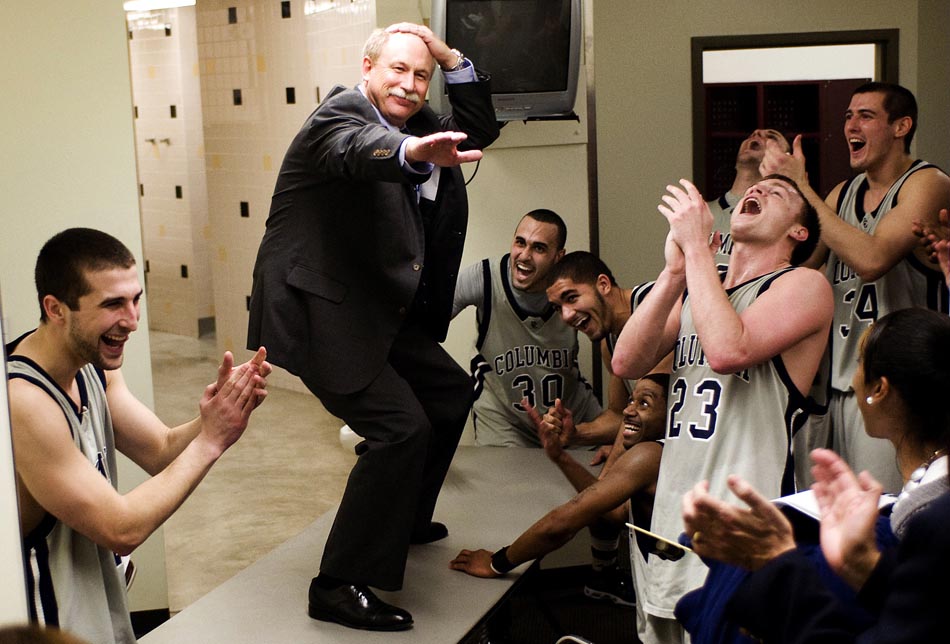
TID:
What a great moment! Please tell us a little of the backstory of the image.
JOSH:
Thanks, I'm really humbled that you chose to interview me. There are a lot of photographers I admire who have been deconstructed here.
I shot this image in 2009 when I was a graduate student at Missouri. That year, Columbia College's men's basketball team made a deep run through the NAIA tournament, eventually making it to the national semifinals. The games were in Kansas City over a weekend and I asked the photo editor at the Columbia Missourian, the University's laboratory newspaper, if anyone else was covering this. They weren't planning on it, but I asked if I could go anyway. I figured if I was going to make good pictures, this would be an ideal situation because of the enormity of the game.
Columbia College was unranked throughout the year, so them making it this far in their tournament was a pretty big deal. Their national semifinal game was close throughout, but they eventually won. As the team kept winning tournament games, Coach Bob Burchard was quoted in sports stories that he told his players to "just keep riding the wave," which is why he's pretending to surf on the table.
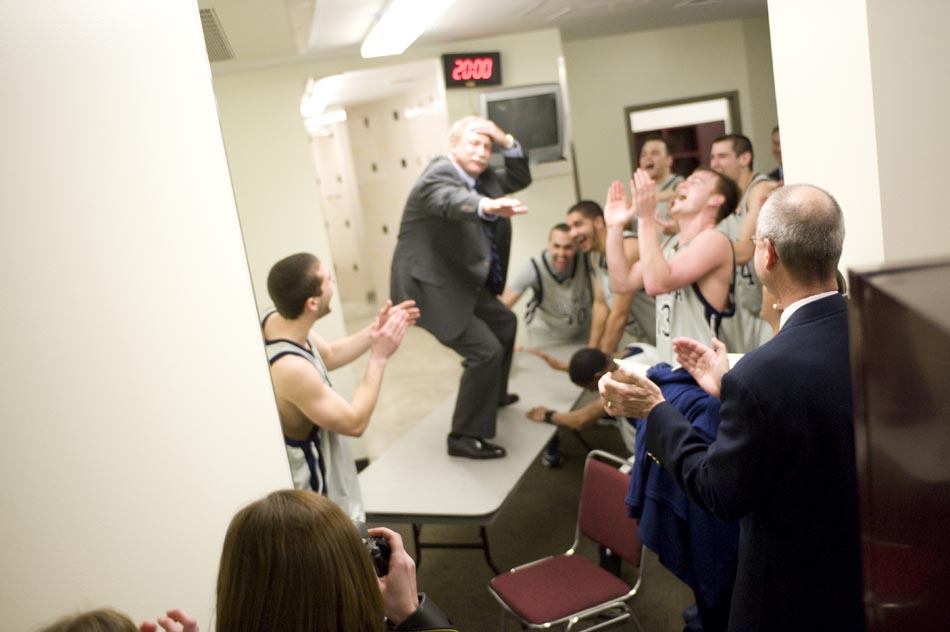
TID:
How did you prepare for this shoot, or what did you do to put yourself in place to make this happen?
JOSH:
I didn't really prepare any differently than I normally do. Whenever I shoot sports, I normally go wide at the end of games so I can get some reaction as players walk off the field or toward the locker room. As the game was ending and it was clear that Columbia College was going to win. I started shooting the bench reacting, the players running onto the court, that kind of stuff. As the players exited the court I hung out for a minute and tried to make some more reaction images, then turned around to head back down the tunnel heading to the media workroom. As I was walking down I saw a crowd and heard a lot of hollering in a room off to the side. I figured it would probably be a good idea to check that out.
TID:
What challenges did you encounter while working to make this image?
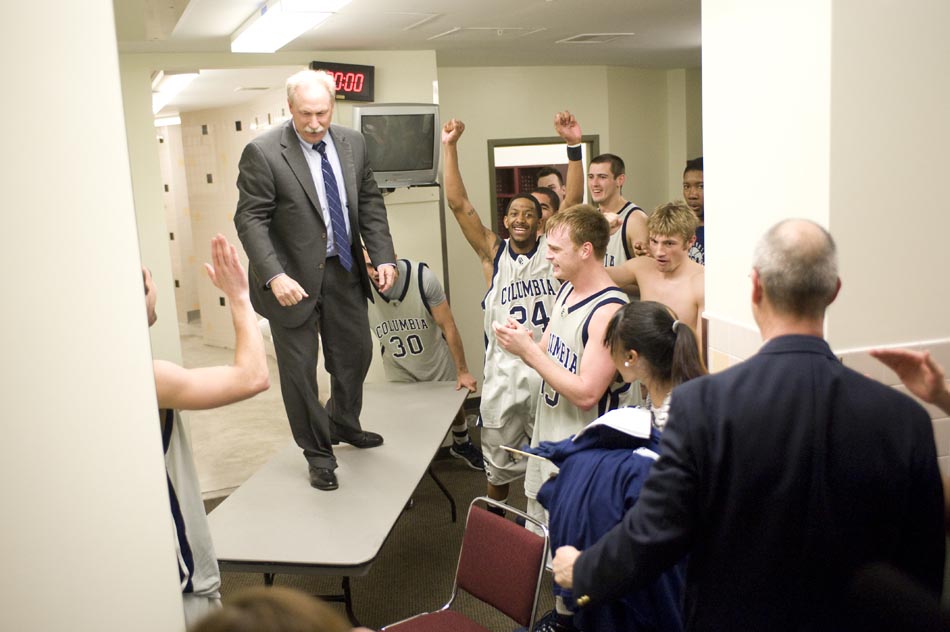
JOSH:
I was literally the last person "on the scene." When I got to the doorway leading into this small room, there was a crowd of school officials, players, a TV cameraman, and I think even some parents and friends too. I was behind all that and I'm not that tall, so I actually took the image while holding the camera above my head. The whole thing lasted about eight seconds, so I didn't really have time to maneuver for better position or change lenses. It was the first time I was ever thrown into a situation where I had to immediately react. Looking back, I wish I was a little bit closer or that I had used a longer lens but once I saw Coach Burchard on that table I knew I had to get something. I didn't have time to think other than "holy shit."
TID:
How did you handle and overcome these problems?
JOSH:
Once I got close enough to see what was happening, I knew that the background was going to be a problem. There was a television, a giant digital clock, a doorway, a table, chairs everywhere, and I'm way in the back. The clock was the first thing I noticed and probably the reason I chose to raise the camera. I didn't want that thing sticking out of Coach Burchard's head. That would have killed it for me.
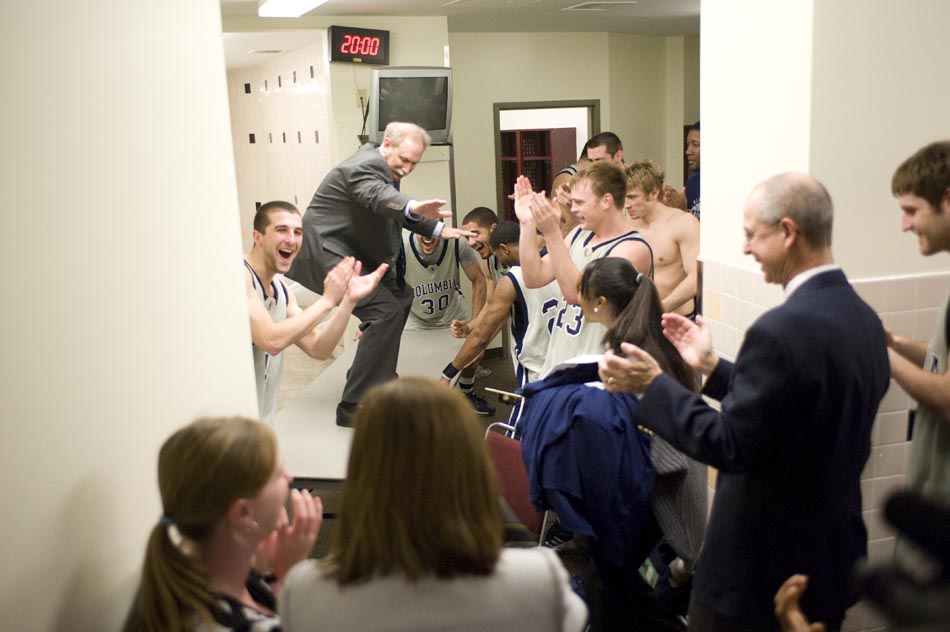
It also happened so fast that I didn't have time to change position, I just had to stay still and hope everything worked out. Plus it was crowded and I didn't want to push everyone around just so I could get an inch closer. I tried to move as little as possible and I remember holding my breath so the camera would stay still.
TID:
Now onto the moment. Can you talk about the moments leading up to the picture and also the actual moment?
JOSH:
Oh man, that is a blur. After the game was over I shot reaction on the court and felt pretty good about what I had. It was a big game, the players were happy, everybody was jumping around and I had a huge adrenalin rush. Whenever I shoot, I try really hard to put myself in the subject's shoes and anticipate their actions and reactions. Throughout the game, I was sitting on the baseline thinking about what might happen next. If they lose, what does that look like? If they win, where's the best place to be to capture that? After it was all over, I was mentally drained just from paying attention and being invested in the game for two hours.
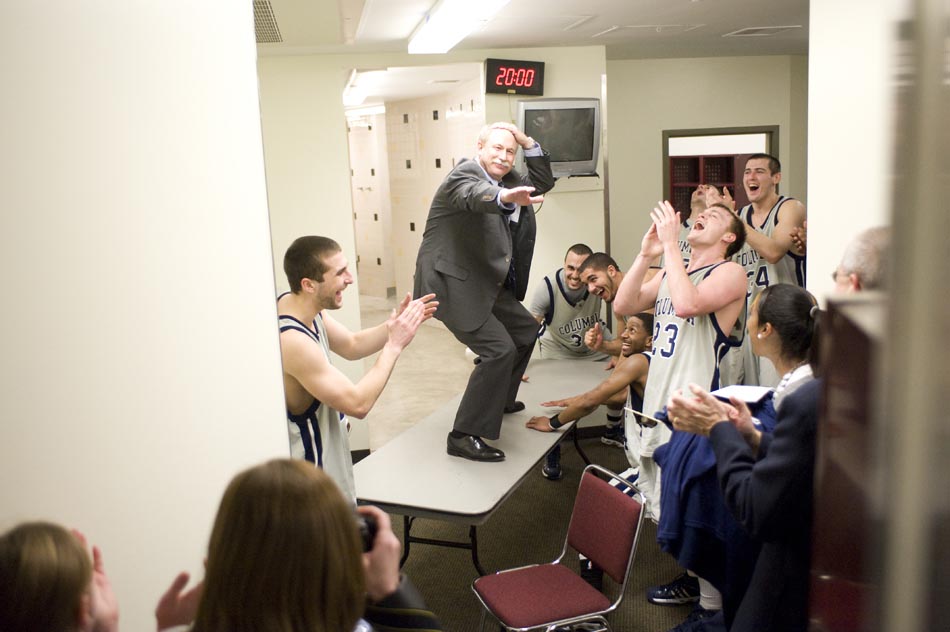
Once the players left the court, I knew I had something that would work for the paper. I had to make deadline, so I decided to turn around and head back to the workroom. When I saw the crowd gathering and heard all the hollering, I guessed something was going on but wasn't sure exactly what.
When I saw Coach Burchard on that table, the only thing going through my mind was, "Please let this be in focus." Click. "Please let this one be straight." Click. "Get a little closer." Click. "Now back off." Click. After I took a few frames I started looking at the players and their faces, and tried to take images that showed their faces and not the backs of their heads, since they were all looking at their coach. The moment itself was quick and I knew it would be over fast. I usually try to be more thoughtful in how I compose and when I click the shutter. This time I just had to pray that it would work out.
TID:
What surprised you about the moment?
JOSH:
Uh, pretty much everything. I had covered a fair amount of sports before that and since, and the one thing I discovered was that coaches don't behave like that, and if they do, it's rare for a photojournalist to see it. Players scream and cry, but coaches remain calm. I 100% expected the players to react when they won, and they did. I never thought I'd see a coach celebrate like that.
It took a little while for me to understand what kind of photo I had. Right after it was over, I was just happy that something was in focus and that I made deadline. I figured it was a unique moment and nothing more. But the more I thought about this image, the more I realized that I couldn't have taken it in 99.9% of the sports situations I'm in. When I covered college sports everything was very controlled: players and coaches control their emotions most of the time and photographers are told where to go, where to sit and the locker room environment is generally off-limits. I'm almost positive I will never, ever see something like this again.
It was also this great moment that sums up the drama of sports. This team was special and they knew it. They knew they did something that no one expected. Coach Burchard reacting this way just shows how special the relationship can be between coaches and players. I'm sure he was and continues to be a great mentor to those young men, and this image kind of shows that.
TID:
What have you learned about yourself in the process of making images like this?
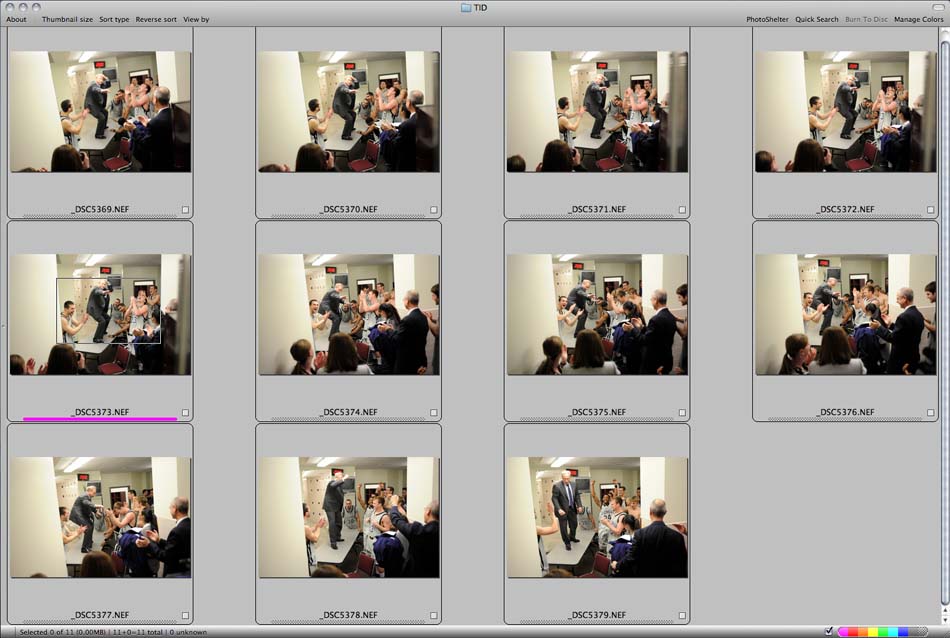
JOSH:
I like to think that I have pretty good instincts and can gauge what situations are going to have the most payoff in terms of making pictures. But I've also learned that if you find yourself in the right place at exactly the right time, you better have your camera ready. I've also learned that no amount of planning can guarantee that you'll make great images. It's really important to go into situations with an open mind.
TID:
How do you keep yourself motivated in situations like this that you've photographed time and time again?
JOSH:
One of the great things about being a photojournalist is never exactly knowing what I'm going to encounter, and that no two situations are alike. That itself is enough to motivate me to be prepared for anything. Also, I always think that I can get better at being a photographer, journalist and human being in general. Knowing that I could always improve motivates me to keep going.
TID:
In conclusion, what advice do you have for photographers?
JOSH:
Be patient. I've been on assignments and worked on projects where I wanted to give up or thought the images I had were good enough. Without fail, if I wait around a little longer, I usually end up making a better picture. Be compassionate towards other people, especially ones you're photographing. I've been around a lot of people that I have nothing in common with and that I may even disagree with, but I always try to understand and respect who they are. You have to have a heart to do this job well.

:::BIO:::
Joshua A. Bickel is the chief photographer for This Week Community News in suburban Columbus, Ohio. He's also worked at newspapers in Missouri and Wyoming and has had work appear in TIME Magazine Online, Education Week and many other national and international media publications.
He occasionally runs half-marathons and lives in downtown Columbus with his fiance and their maltipoo, Nola.
His work can be viewed at www.joshuabickel.com.
EDITOR'S NOTE:
This week's post was a guest interview done by Matthew Busch, an editorial photographer currently based in Jasper, IN as an intern at The Herald.
He graduated from the University of Missouri in 2012 with a Bachelors of Journalism.